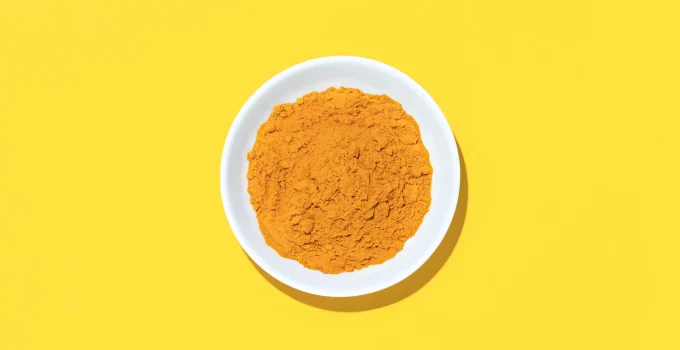Turmeric, often hailed as the golden superfood, has been a cornerstone of traditional medicine for centuries. This vibrant yellow spice, derived from the root of the Curcuma longa plant, is renowned for its remarkable health benefits. In this article, we will explore the myriad ways Turmeric can enhance your well-being and why incorporating this potent spice into your diet can be a game-changer.
The Nutritional Powerhouse of Turmeric

Turmeric is more than just a flavorful spice; it’s a nutritional powerhouse packed with bioactive compounds. The most notable of these is curcumin, which is responsible for most of Turmeric’s health benefits. Curcumin is a potent anti-inflammatory and antioxidant agent, making Turmeric an essential addition to a health-conscious diet.
Nutritional Benefits of Turmeric:
- Anti-Inflammatory Properties: Chronic inflammation is a root cause of many diseases, including heart disease, cancer, and Alzheimer’s. Curcumin in Turmeric has powerful anti-inflammatory effects that can help combat these conditions.
- Antioxidant Rich: Turmeric is loaded with antioxidants, which protect your body from oxidative stress and damage caused by free radicals.
- Boosts Brain Function: Curcumin can increase levels of brain-derived neurotrophic factor (BDNF), a growth hormone that functions in the brain, potentially delaying or even reversing many brain diseases and age-related decreases in brain function.
- Heart Health: Curcumin improves the function of the endothelium, which is the lining of the blood vessels, thus helping regulate blood pressure and reducing the risk of heart disease.
- Cancer Prevention: Studies suggest that curcumin can reduce the growth of cancerous cells and inhibit the growth of tumors.
Turmeric and Its Role in Traditional Medicine
For centuries, Turmeric has been a staple in Ayurvedic and Chinese medicine, used to treat a variety of ailments. Its application ranges from treating wounds and infections to alleviating digestive issues and chronic pain. The traditional use of Turmeric underscores its versatility and effectiveness as a natural remedy.
Traditional Uses of Turmeric:
- Digestive Aid: Turmeric stimulates the gallbladder to produce bile, which helps in digestion and reduces symptoms of bloating and gas.
- Wound Healing: Due to its antibacterial and anti-inflammatory properties, Turmeric has been used to cleanse wounds and promote faster healing.
- Skin Conditions: Turmeric is used in the treatment of various skin conditions, including acne, psoriasis, and eczema, owing to its anti-inflammatory and antimicrobial properties.
- Joint Health: Traditional medicine has long recognized Turmeric’s ability to reduce joint pain and stiffness associated with arthritis.
Incorporating Turmeric into Your Diet
Adding Turmeric to your diet can be simple and delicious. Here are some ways to incorporate this golden superfood into your meals:
Turmeric in Cooking:
- Golden Milk: A warm, comforting drink made by simmering milk with Turmeric, ginger, cinnamon, and a touch of honey. This soothing beverage is perfect for winding down in the evening.
- Smoothies: Blend a teaspoon of Turmeric into your morning smoothie for an antioxidant boost.
- Curries and Soups: Turmeric is a staple ingredient in many curry recipes. Its earthy flavor adds depth to soups and stews.
- Salad Dressings: Mix Turmeric with olive oil, lemon juice, and a pinch of salt for a flavorful and healthy salad dressing.
Turmeric Supplements: If incorporating Turmeric into your diet isn’t convenient, Turmeric supplements are an excellent alternative. Look for high-quality supplements with added black pepper (piperine), which enhances the absorption of curcumin.
The Science Behind Turmeric’s Health Benefits
Anti-Inflammatory Effects: Curcumin is a bioactive substance that fights inflammation at the molecular level. Chronic inflammation is known to be a significant contributor to many common Western diseases. Curcumin blocks NF-kB, a molecule that travels into the nuclei of your cells and turns on genes related to inflammation. NF-kB is believed to play a major role in many chronic diseases.
Antioxidant Properties: Oxidative damage is believed to be one of the mechanisms behind aging and many diseases. Curcumin is a potent antioxidant that can neutralize free radicals due to its chemical structure. Additionally, curcumin boosts the activity of your body’s own antioxidant enzymes.
Boosting Brain-Derived Neurotrophic Factor: Curcumin can increase brain levels of BDNF, a type of growth hormone that functions in the brain. Many common brain disorders have been linked to decreased levels of this hormone, including depression and Alzheimer’s disease. By increasing BDNF levels, curcumin may delay or even reverse many brain diseases and age-related decreases in brain function.
Lowering the Risk of Heart Disease: Heart disease is the number one cause of death in the world. Curcumin may help reverse many steps in the heart disease process. Perhaps the main benefit of curcumin when it comes to heart disease is improving the function of the endothelium, the lining of your blood vessels. Several studies suggest that curcumin leads to improvements in endothelial function.
Cancer Prevention: Curcumin has been studied as a beneficial herb in cancer treatment and has been found to affect cancer growth, development, and spread at the molecular level. Studies have shown that it can contribute to the death of cancerous cells and reduce angiogenesis (growth of new blood vessels in tumors) and metastasis (spread of cancer).
Practical Tips for Using Turmeric
- Start Small: If you’re new to Turmeric, start with small amounts to see how your body reacts. Gradually increase the dosage to avoid any potential digestive discomfort.
- Enhance Absorption: Curcumin is poorly absorbed into the bloodstream. To enhance absorption, consume Turmeric with black pepper. Piperine, found in black pepper, increases the absorption of curcumin by 2,000%.
- Combine with Healthy Fats: Curcumin is fat-soluble, meaning it breaks down and dissolves in fat or oil. Eating Turmeric with healthy fats such as coconut oil, olive oil, or avocado can help your body absorb it more effectively.
Conclusion
Turmeric, with its vibrant color and robust health benefits, is truly a golden superfood. From its powerful anti-inflammatory and antioxidant properties to its potential in preventing and treating various diseases, Turmeric stands out as a versatile and linetogel potent natural remedy. By incorporating Turmeric into your diet, whether through cooking or supplements, you can harness the many health benefits this remarkable spice has to offer. Embrace the power of Turmeric and unlock the potential for a healthier, more vibrant life.
Whether you’re looking to boost your brain function, support heart health, or simply add a flavorful spice to your meals, Turmeric is an excellent choice. So why wait? Start enjoying the benefits of Turmeric today and experience the difference it can make in your overall well-being.




